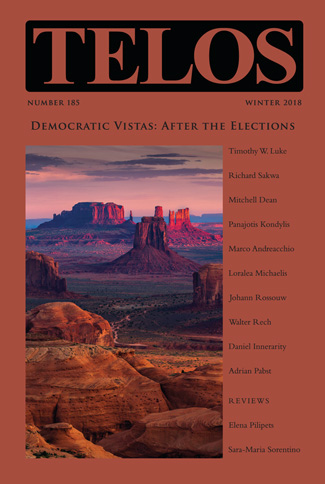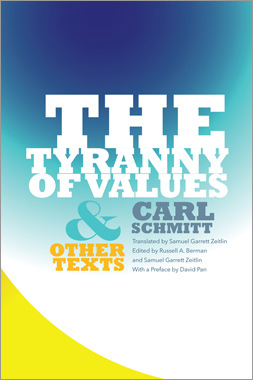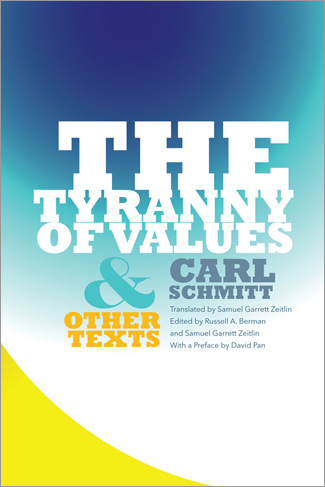By Mitchell Dean · Friday, February 8, 2019 Mitchell Dean’s “Oath and Office” appears in Telos 185 (Winter 2018). Read the full article at the Telos Online website, or purchase a print copy of the issue in our online store. Individual subscriptions to Telos are available in both print and online formats.
 The oath pertains to law, sovereignty, and office. A public servant takes an oath. A witness and a juror at a trial swear an oath. The British monarch swears a coronation oath and the president-elect of the United States an oath of office. While the coronation of the monarch has been regarded as “medieval” and the inauguration of the president as “ceremonial” or “symbolic,” it would be a mistake to view them as empty rituals, particularly the oaths taken. And while the oath invokes God, it would be an error to assume that it is merely an atavism, a retroversion, or a vestige of a more religious past. But what it is and what it does is far from clear, including to those who swear oaths. When President Obama, sworn in by Chief Justice John Roberts, misspoke his oath of office in January 2009, he was advised to retake it the next day, as the White House counsel put it, “out of an abundance of caution.” Ex abundanti cautela might indeed by the principle that scholars should adopt, given the thicket of false trails, unfathomable origins, prejudices, and commonplaces that afflict any attempt to study this practice. The appropriate method to study the oath uses multiple examples and cases, considers them from as many different viewpoints as it can, and remains wary of both our commonsense assumptions about its origins and efficacy and their theoretical correlates. The oath pertains to law, sovereignty, and office. A public servant takes an oath. A witness and a juror at a trial swear an oath. The British monarch swears a coronation oath and the president-elect of the United States an oath of office. While the coronation of the monarch has been regarded as “medieval” and the inauguration of the president as “ceremonial” or “symbolic,” it would be a mistake to view them as empty rituals, particularly the oaths taken. And while the oath invokes God, it would be an error to assume that it is merely an atavism, a retroversion, or a vestige of a more religious past. But what it is and what it does is far from clear, including to those who swear oaths. When President Obama, sworn in by Chief Justice John Roberts, misspoke his oath of office in January 2009, he was advised to retake it the next day, as the White House counsel put it, “out of an abundance of caution.” Ex abundanti cautela might indeed by the principle that scholars should adopt, given the thicket of false trails, unfathomable origins, prejudices, and commonplaces that afflict any attempt to study this practice. The appropriate method to study the oath uses multiple examples and cases, considers them from as many different viewpoints as it can, and remains wary of both our commonsense assumptions about its origins and efficacy and their theoretical correlates.
Continue reading →
By Telos Press · Friday, February 1, 2019 Writing at Infrapolitical Deconstruction, Gerardo Muñoz reviews the new English translation of Carl Schmitt’s The Tyranny of Values and Other Texts, now available from Telos Press Publishing. Order your copy in our online store, and save 20% on the list price by using the coupon code BOOKS20 during the checkout process.
An excerpt:
 As David Pan correctly observes in the Preface, the Schmitt that we encounter here is one that is confronting the transformations of political enmity in light of a gloomy and dangerous takeover of a global civil war. In fact, one could most definitely argue that the Schmitt thinking within the Cold War epochality is one that is painstakingly searching for a “Katechon,” that restraining force inherited from Christian theology in order to give form to the ruination of modern legal and political order. The global civil war, cloaked under a sense of acknowledged Humanism, now aimed at the destruction of the enemy social’s order and form of life. This thematizes the existential dilemma of a jurist who was consciousness of the dark shadow floating over the efficacy of Western jurisprudence. In other words, the post-war Schmitt is one marked by a profound Hamletian condition in the face of the technical neutralization of every effective political theology. This condition puts Schmitt on the defensive, rather than on the offensive, as his later replies to Erik Peterson, Hans Blumenberg, or Jacob Taubes render visible. As David Pan correctly observes in the Preface, the Schmitt that we encounter here is one that is confronting the transformations of political enmity in light of a gloomy and dangerous takeover of a global civil war. In fact, one could most definitely argue that the Schmitt thinking within the Cold War epochality is one that is painstakingly searching for a “Katechon,” that restraining force inherited from Christian theology in order to give form to the ruination of modern legal and political order. The global civil war, cloaked under a sense of acknowledged Humanism, now aimed at the destruction of the enemy social’s order and form of life. This thematizes the existential dilemma of a jurist who was consciousness of the dark shadow floating over the efficacy of Western jurisprudence. In other words, the post-war Schmitt is one marked by a profound Hamletian condition in the face of the technical neutralization of every effective political theology. This condition puts Schmitt on the defensive, rather than on the offensive, as his later replies to Erik Peterson, Hans Blumenberg, or Jacob Taubes render visible.
Continue reading →
By Marco Andreacchio · Thursday, January 31, 2019 Marco Andreacchio’s “Epistemology’s Political-Theological Import in Giambattista Vico” appears in Telos 185 (Winter 2018). Read the full article at the Telos Online website, or purchase a print copy of the issue in our online store. Individual subscriptions to Telos are available in both print and online formats.
The twentieth-century rise to fame of Giambattista Vico as anticipator of historical relativism obscures essential elements of the eighteenth-century philosopher’s message. Vico’s stringent argumentation points well beyond contemporary expectations, offering a classical alternative to both a political depreciation of metaphysics and a metaphysical depreciation of politics. Carrying on a Renaissance tradition inaugurated most notably by Dante Alighieri, Vico invites us to rediscover or return to the poetic language of pagan antiquity as political-theological key to philosophical reflection upon the nature of the human mind. What Vico intends to defend are not old myths as such, but the essential independence of the human mind from any and all myths, be they ancient, medieval, or modern.
Continue reading →
By Telos Press · Monday, December 17, 2018 New from Telos Press: The Tyranny of Values and Other Texts, by Carl Schmitt. Translated by Samuel Garrett Zeitlin, edited by Russell A. Berman and Samuel Garrett Zeitlin, and with a preface by David Pan. Order your copy in our online store, and save 20% on the list price by using the coupon code BOOKS20 during the checkout process.
 Written during the Weimar Republic, the Nazi era, and the Cold War, this collection of occasional pieces provides an instructive look at the ways in which Carl Schmitt employed his theories in order to make judgments about contemporary historical events and problems. Covering topics such as the political significance of universalism and jurisprudence, the meaning of the partisan, the world-historical significance of the Cold War, the deterioration of metaphysics into “values,” the relationship between theoretical concepts and concrete historical situations, and his views on thinkers such as Machiavelli, Bodin, and Rousseau, these essays establish a revealing counterpoint to his more formal work. They react on the one hand directly to contemporary political questions and demonstrate the way in which he saw the immediate historical significance of his ideas. On the other hand, he also feels free to provide in these pieces the kinds of methodological reflections that help us to better understand the particular epistemological framework that makes his thought so unique. Written during the Weimar Republic, the Nazi era, and the Cold War, this collection of occasional pieces provides an instructive look at the ways in which Carl Schmitt employed his theories in order to make judgments about contemporary historical events and problems. Covering topics such as the political significance of universalism and jurisprudence, the meaning of the partisan, the world-historical significance of the Cold War, the deterioration of metaphysics into “values,” the relationship between theoretical concepts and concrete historical situations, and his views on thinkers such as Machiavelli, Bodin, and Rousseau, these essays establish a revealing counterpoint to his more formal work. They react on the one hand directly to contemporary political questions and demonstrate the way in which he saw the immediate historical significance of his ideas. On the other hand, he also feels free to provide in these pieces the kinds of methodological reflections that help us to better understand the particular epistemological framework that makes his thought so unique.
Continue reading →
By Russell A. Berman · Wednesday, December 12, 2018 Telos 185 (Winter 2018) is now available for purchase in our store. Individual subscriptions to Telos are also available in both print and online formats.
 Recall the 2016 campaign and even more the aftermath of the Trump victory: otherwise reasonable people rushed into heated rhetoric regarding the imminence of dictatorship and the end of democracy as we know it. Comparisons of the America of 2016 and Germany of 1933 proliferated, while denunciations of Republicans as Nazis or Nazi collaborators became common. It would be a worthwhile project for a student or scholar of American culture to cull through those statements and confront their authors with them today: if they were so wrong in 2016, what value is their judgment today, moving forward? Recall the 2016 campaign and even more the aftermath of the Trump victory: otherwise reasonable people rushed into heated rhetoric regarding the imminence of dictatorship and the end of democracy as we know it. Comparisons of the America of 2016 and Germany of 1933 proliferated, while denunciations of Republicans as Nazis or Nazi collaborators became common. It would be a worthwhile project for a student or scholar of American culture to cull through those statements and confront their authors with them today: if they were so wrong in 2016, what value is their judgment today, moving forward?
For those predictions were simply and utterly wrong. Of course, the Republican in the White House and the Republican-controlled Congress pursued a version of a conservative agenda (although not always with success, as in the case of health care). But the rule of law prevailed, courts could decide against the government, the liberal part of the press has been articulate in its critique of administration policies, and, in a quite normal and proper manner, the midterm elections took place. American institutions have proven much more robust than the hysterics of little faith claimed in 2016. Those prophets of dictatorship owe us an accounting—or actually an apology—for their hyperbole. They significantly trivialized what really happened under the Nazi dictatorship, and they cavalierly slandered that slightly less than half of the American electorate that voted for Trump. Time for some critical self-reflection? This is not at all a suggestion that they must endorse the president, but it is way past time for them to concede that his supporters are not a priori Nazis, no matter how much juvenile fun name-calling affords.
Continue reading →
By Seo-Young Chu · Thursday, November 29, 2018 Seo-Young Chu’s “The DMZ Responds” appears in Telos 184 (Fall 2018), a special issue on Korea. Read the full article at the Telos Online website, or purchase a print copy of the issue in our online store. Individual subscriptions to Telos are available in both print and online formats.
Over the years the two Koreas have been repeatedly personified and anthropomorphized (in movies, journalism, and even nonfiction books) but never in a consistent manner. Are South Korea and North Korea twin siblings separated at birth? Are they fellow patients in a psychiatric ward? Are they doomed heterosexual lovers, each unaware that the other is a spy? Are they clones? Are they organ donor (South) and recipient (North)? If not separate human beings, then are the Koreas parts of what used to be a single body that was severed? Are they nation (limb) and phantomnation (phantom limb, as experienced by an amputee), as Theresa Hak Kyung Cha suggests in her 1982 work Dictee? The inconsistency of these and other characterizations ends up revealing the tragically illogical nature of the division that made such characterizations possible in the first place. The fact that the personification of the Koreas resists coherent formulation at once reflects and explains the inability of the “two Koreas” to relate to each other in a way that makes sense.
Continue reading →
|
|
 The oath pertains to law, sovereignty, and office. A public servant takes an oath. A witness and a juror at a trial swear an oath. The British monarch swears a coronation oath and the president-elect of the United States an oath of office. While the coronation of the monarch has been regarded as “medieval” and the inauguration of the president as “ceremonial” or “symbolic,” it would be a mistake to view them as empty rituals, particularly the oaths taken. And while the oath invokes God, it would be an error to assume that it is merely an atavism, a retroversion, or a vestige of a more religious past. But what it is and what it does is far from clear, including to those who swear oaths. When President Obama, sworn in by Chief Justice John Roberts, misspoke his oath of office in January 2009, he was advised to retake it the next day, as the White House counsel put it, “out of an abundance of caution.” Ex abundanti cautela might indeed by the principle that scholars should adopt, given the thicket of false trails, unfathomable origins, prejudices, and commonplaces that afflict any attempt to study this practice. The appropriate method to study the oath uses multiple examples and cases, considers them from as many different viewpoints as it can, and remains wary of both our commonsense assumptions about its origins and efficacy and their theoretical correlates.
The oath pertains to law, sovereignty, and office. A public servant takes an oath. A witness and a juror at a trial swear an oath. The British monarch swears a coronation oath and the president-elect of the United States an oath of office. While the coronation of the monarch has been regarded as “medieval” and the inauguration of the president as “ceremonial” or “symbolic,” it would be a mistake to view them as empty rituals, particularly the oaths taken. And while the oath invokes God, it would be an error to assume that it is merely an atavism, a retroversion, or a vestige of a more religious past. But what it is and what it does is far from clear, including to those who swear oaths. When President Obama, sworn in by Chief Justice John Roberts, misspoke his oath of office in January 2009, he was advised to retake it the next day, as the White House counsel put it, “out of an abundance of caution.” Ex abundanti cautela might indeed by the principle that scholars should adopt, given the thicket of false trails, unfathomable origins, prejudices, and commonplaces that afflict any attempt to study this practice. The appropriate method to study the oath uses multiple examples and cases, considers them from as many different viewpoints as it can, and remains wary of both our commonsense assumptions about its origins and efficacy and their theoretical correlates. 



